In the period after World War II, the capitals of Europe were left in upheaval, with an urgency to economically and physically rebuild what has been destroyed.
The climate for art in Paris, the center of the art world, was a disaster.
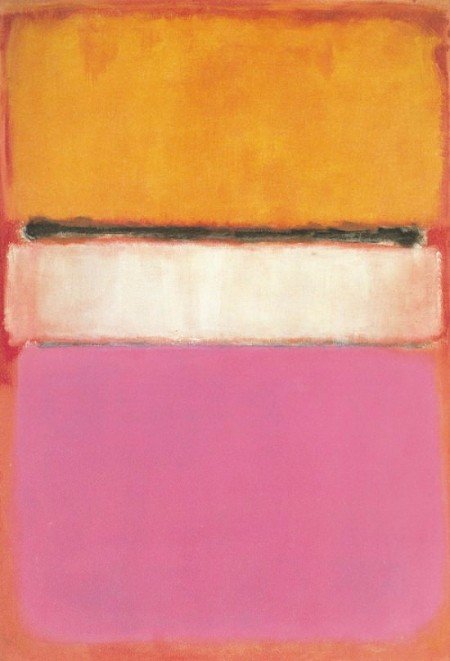
Mark Rothko, White-center, 1950. Oil on canvas.
After the war, the focus of modern art moved West, from Europe to North America, and that's where new tendencies in aesthetics took shape.
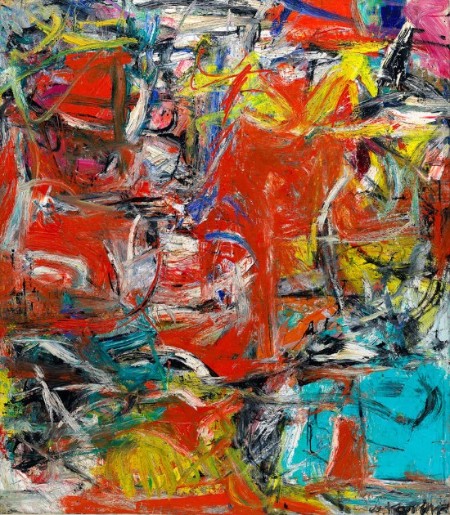
Willem de Kooning, Composition, 1955. OIl on canvas.
As they discovered European Surrealism, American artists like Jackson Pollock, Willem de Kooning, Robert Motherwell, and Mark Rothko, were attracted by the mystery and the magic of the incomprehensible that made the Surrealist movement before them.
It was in that environment that they forged Abstract Expressionism, an innovative visual art that explored new coloristic and psychological dimensions to painting.
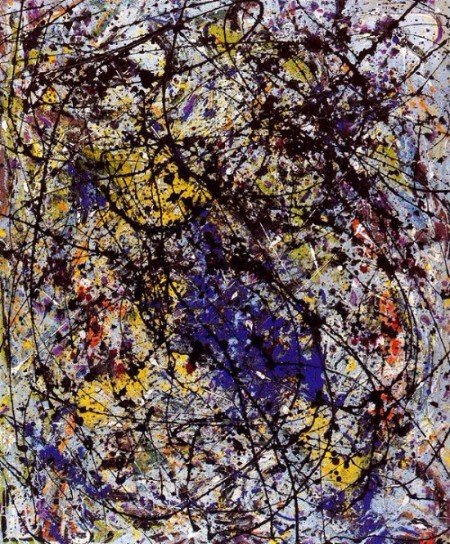
Jackson Pollock, Reflections of the big dipper, 1947. Oil on canvas.
For the most part Abstract Expressionists were committed to non-representation, although the imagery and scale of their works often addressed reality metaphorically.
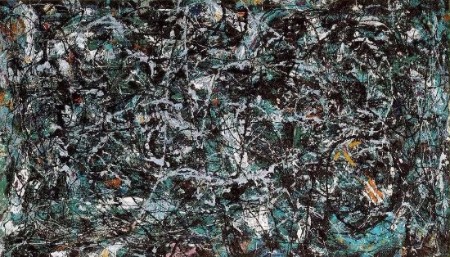
Jackson Pollock, Full fathom five, 1947. Oil on canvas.
Canvases of Pollock and Motherwell were articulating their authentic response to the age of the radio, the automobile, the atomic bomb, and events such as the Spanish Civil War.
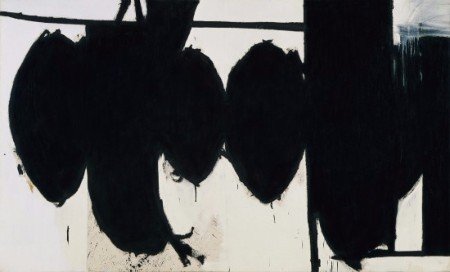
Robert Motherwell, Elegy to the Spanish Republic No 34, 1956. Oil on canvas.
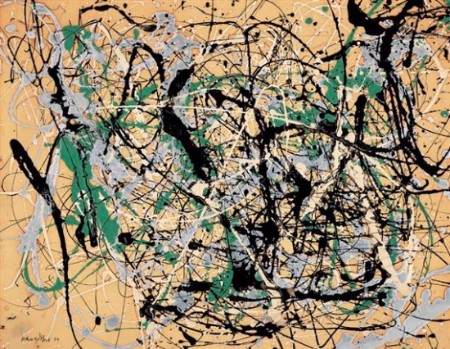
Jackson Pollock, Number 17, 1949. Oil on canvas.
By eliminating recognizable subject matter in their paintings, Abstract Expressionists succeeded in creating a prosperous art movement that coincidentally served their country’s political interests.
As a matter of fact, by 1956, works of artists such as De Koonings, Rothko, Pollock, and Motherwell were indirectly backed by a CIA covert campaign in which the Museum of Modern Art in New York played in the forefronts.
MoMA promoted American Abstract Expressionism in international shows in Italy, Brazil, and even countries like Venezuela, India, and Japan.
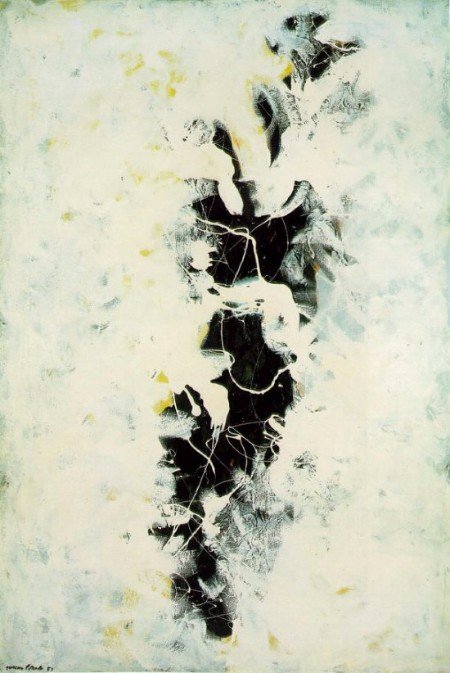
Jackson Pollock, The-Deep, 1953. Oil on canvas.
Heralded as the "artistic coming of age of America", Abstract Expressionist paintings were exported abroad during the propaganda war with the Soviet Union. This new artistic movement was held up as proof of the creativity, the intellectual freedom, and the cultural power of the US.
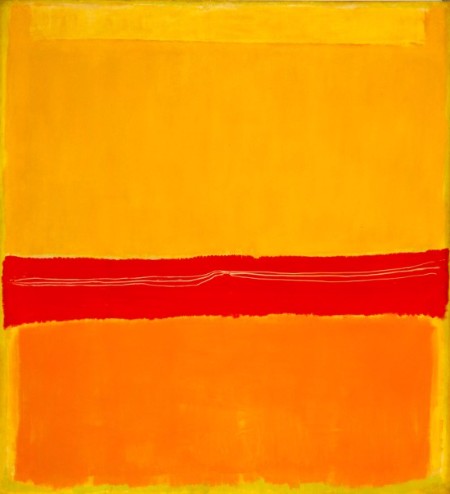
Mark Rothko. No. 5/No. 22. 1950. Oil on canvas.
In 1995, Donald Jameson, a former case officer of CIA, confirmed that the CIA had a secret campaign to promote Abstract Expressionism to the world in order to show how free the US was compared to the Soviet and all that unbeknownst to the artists themeselves.
“Abstract Expressionism was the kind of art that made Socialist Realism look even more stylized and more rigid and confined than it was. Russian art, strapped into the communist ideological straitjacket, could not compete.” Mr. Jameson explained.

Willem de Kooning, Marilyn Monroe, 1954. Oil on canvas.
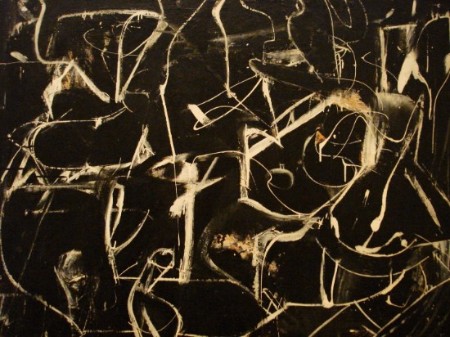
Willem de Kooning, Untitled, 1949. Oil on canvas.
Abstract meant that it had made no reference to the material world, yet it was highly expressive, and conveyed strong emotions.
The artists who were part of that movement believed that Art is an adventure into an unknown world, a simple expression of the complex thought.
It reached down the subconscious, touched spiritual emotions, and provided an authentic experience.
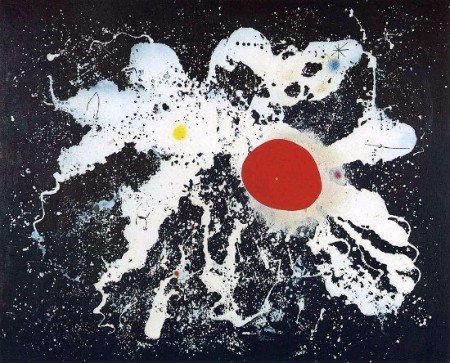
Joan Miro, The red disk, 1960. Oil on canvas.
Follow me for more on this Modern Art series.
https://steemit.com/@achraf7b
References & Additional Resources:

Hi! I am a robot. I just upvoted you! I found similar content that readers might be interested in:
http://www.independent.co.uk/news/world/modern-art-was-cia-weapon-1578808.html
Downvoting a post can decrease pending rewards and make it less visible. Common reasons:
Submit
Yes bot...It's already referenced.
Downvoting a post can decrease pending rewards and make it less visible. Common reasons:
Submit
ooh just stumbled on this post... fantastic. I'm off to read the rest of your series now. Cheers!
Downvoting a post can decrease pending rewards and make it less visible. Common reasons:
Submit
thanks @johleen
Downvoting a post can decrease pending rewards and make it less visible. Common reasons:
Submit
Congratulations @achraf7b! You have completed some achievement on Steemit and have been rewarded with new badge(s) :
Click on any badge to view your own Board of Honor on SteemitBoard.
For more information about SteemitBoard, click here
If you no longer want to receive notifications, reply to this comment with the word
STOPDownvoting a post can decrease pending rewards and make it less visible. Common reasons:
Submit
Congratulations! This post has been upvoted from the communal account, @minnowsupport, by achraf7b from the Minnow Support Project. It's a witness project run by aggroed, ausbitbank, teamsteem, theprophet0, and someguy123. The goal is to help Steemit grow by supporting Minnows and creating a social network. Please find us in the Peace, Abundance, and Liberty Network (PALnet) Discord Channel. It's a completely public and open space to all members of the Steemit community who voluntarily choose to be there.
If you like what we're doing please upvote this comment so we can continue to build the community account that's supporting all members.
Downvoting a post can decrease pending rewards and make it less visible. Common reasons:
Submit
que bueno este post, sirve de mucha ayuda para cualquier pintor o amante del arte
Downvoting a post can decrease pending rewards and make it less visible. Common reasons:
Submit